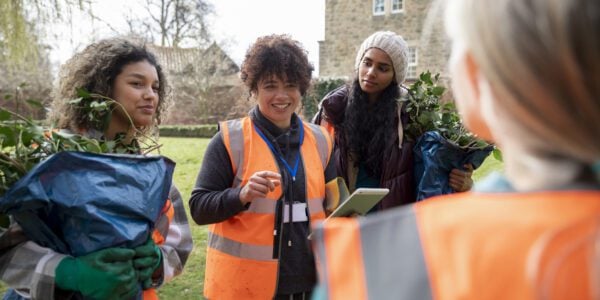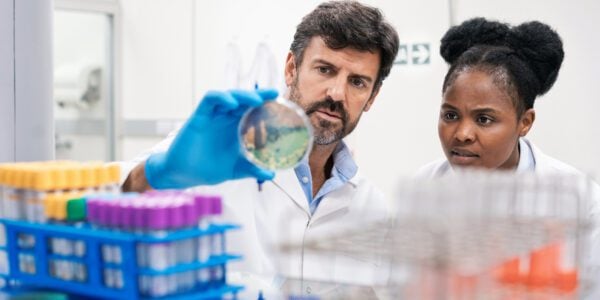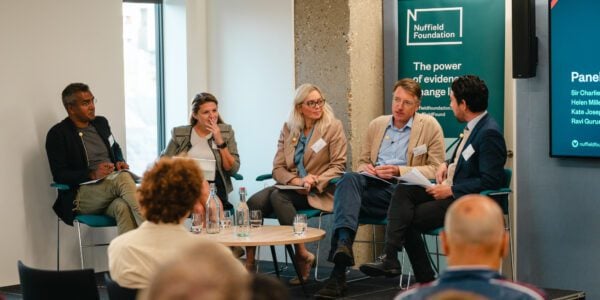We are all beginning to look beyond the pandemic. The Nuffield Foundation wants the work it funds over the next two years to make a marked contribution to shaping the society that emerges from the consequences of COVID-19, just as the projects we funded last year charted its effects and the implications as it took hold.
A year ago, we responded to the onset of the pandemic with an invitation to researchers to address the wider social implications of the accelerating crisis. We offered fast-track funding for proposals that would capture, as it unfolded, contemporaneous data and insights across our core areas of interest in Education, Justice and Welfare. Between April and June, the Foundation awarded grants to around a dozen new projects to a value of £2.7m. Their findings now constitute an influential evidence base that has identified some of the most acute points of stress in our schools and communities, informed government policy responses and influenced practice on the ground as we have all faced up to the enduring consequences of COVID-19.
- We are now inviting our applicants to submit new research proposals that will continue to explore the medium- and long-term effects of COVID-19 across British society, and provide evidence and insights that can inform the public policy agenda over the next decade.
- We will fast-track applications from our outline application rounds to enable research projects swiftly to capture relevant data and report in a timely fashion, where there is a need. We are keeping open our current March application round until 29 April to encourage any further applicants that wish to respond to this opportunity.
- We are also reinforcing the Nuffield Foundation’s distinctive purpose of advancing social well-being and educational opportunity by re-stating it around the pressing social and economic issues the pandemic has intensified.
- To help align our interests further with our applicants, we are also setting out a refreshed description of the type of research we fund and the criteria we look for in a successful application.
COVID-19 and the Nuffield Foundation’s agenda
One year on, the deep-seated social, economic and cultural effects of the pandemic are abundantly apparent. COVID-19 has accelerated a debate in the UK around equity and public value. The role, responsibilities and capacity of the State, at national, devolved and regional levels, have been brought into sharper focus. What began as a public health crisis is now seen through a series of prisms – intergenerational equity; educational disadvantage; stark differences in social geography; the differential cost to our most disadvantaged and ethnic minority communities; social care, and support for those most vulnerable to the mental and physical impacts of the pandemic; gender inequality; access to justice and wider questions of social and racial justice.
At the same time, local and community connections, and the informal ties of family and friendship, have demonstrated their innate value in our personal lives, even as we have found our access to them constrained. One thread that weaves its way through these issues is the accelerating impact of digitally driven technologies on all aspects of people’s experience, both in providing support and solutions but also revealing embedded inequalities in, for example, educational opportunity, and social exclusion.
All these issues are at the heart of the Nuffield Foundation’s agenda. We believe there is a window of opportunity in the next two years to frame the evidence and arguments that will determine UK social policy over a decade that will be overshadowed by the pandemic’s consequences. We encourage the research community to respond to the opportunity with proposals that reach across disciplinary and methodological boundaries to address these complex intersectional problems.
A just and inclusive society: re-articulating our distinctive purpose
The Nuffield Foundation’s original purpose – “the advancement of social well-being” remains as salient today as when first set out in 1943. In some ways, 2021 can be seen as a similar watershed – some have described this as a “Beveridge” moment – when the principles and foundations of the British social contract have the opportunity to be re-thought. The pandemic has not changed the Nuffield Foundation’s strategic direction, but it has channelled it. It has brought to the fore our focus on growing levels of inequalities, vulnerability and disadvantage, issues that now have an insistent urgency in the public conversation.
Our 2017-22 Strategy focused our research interests into three broad domains, Education, Justice and Welfare, as those that underpin a well-functioning society. The pandemic’s effects have underlined why these three domains are our chosen key determinants of social well-being. Justice, broadly conceived, can be described as at the fulcrum of our work; a precondition of social well-being must be that those whose lives are constrained by inequality and disadvantage should have equal access to the same resources to seek redress and to resolve their problems.
We are therefore signaling our research interest in understanding the foundations and pathways of a just and inclusive society, and the restrictions to achieving it. In advancing social well-being, we view increasing well-being and opportunity for the most disadvantaged as the primary imperative. Our aim is to address inequalities, discrimination and vulnerabilities in Education, Justice and Welfare, and understand how they intersect to determine people’s lives. We also seek to understand the impacts of science and technologies on equitable outcomes in a digitally determined world.
Methods and approaches
Our starting point is the necessity for robust evidence to underpin the interfaces between research and effective policy and practice, and the consequent opportunities to empower people and improve their lives. Our portfolio ranges from projects with direct policy impact to those that move on thinking in the field over the longer term. We embrace methodological pluralism and synthesis and place the highest value on identifying the methods appropriate to each research question. We are also prepared to embrace work of an exploratory and high-risk nature. We recognise, (and have seen this year), that in an increasingly diverse and complex society there are communities which can become invisible to traditional research methods. Our requirement for conceptual and methodological rigour relates to our belief that robust evidence and analysis underpins the efficacy of policy and credibility of advocacy. We support work that aligns with our reputation for authoritative, non-partisan and empirical research. This however should not, in any sense, constrain an applicant’s commitment to a topic or the recommendations that arise from robust evidence.
Convening: giving research impact and influence on public policy
We convene different minds and interests from different sectors who are working on the same problems, to ensure the research we fund identifies and reaches its relevant audiences and can shape policy and practice over the medium to long term. We build relationships with and between our different stakeholders and then expect them to work closely with us to achieve this. We also believe, particularly in the light of what we have learned from the pandemic, that research should find ways of giving sufficient voice to those who are its subject.
Responding to the post-pandemic moment – fast-tracking pathways to funding
When the pandemic struck a year ago, our imperative was to get research into the field within a matter of weeks. The research challenges today are of a somewhat different kind. We still expect to receive some applications which respond to fast moving policy issues in the debate about post COVID-19 social reconstruction. We will do all we can to facilitate this type of research by fast-tracking those applications where there is some urgency to undertake research and report within a defined period. Applicants can request fast-track status, providing a clear rationale for why it is appropriate. We expect only to do this in a few cases, but where we decide an application merits fast-track consideration, we hope to halve the decision process to around 3-4 months. Applications should be submitted within our existing gathered fields. To encourage such timely applications, we have extended our March 2021 deadline to 29 April. We would hope to make fast-track decisions by the end of July. There is a further gathered field deadline in September. Fast track decisions in this round will be made by February 2022.
The criteria for Nuffield Foundation research projects
In encouraging diversity of thinking, we fund a wide range of research. The projects we support fall across three broad types of work – primary research (involving new empirical data collection, quantitative or qualitative), secondary data analysis (including data linkage projects), and synthesis or policy-related work. The range of applications leads us to use different modes of assessment of the methods they employ. There are also some important considerations around the type of research we fund – for example, we do not fund data collection without it being part of a wider package of work including analysis and reporting.
We also want our applicants to take account of some overarching criteria that we apply to ensure we assess proposals in a suitably equivalent manner. These takes the form of a “mental checklist” to inform our decisions; we do not apply it as a rigid rulebook.
- Is the research question relevant?
- Is there a clear conceptual framework?
- Is the question researchable and the methodology appropriate and rigorous?
- Does the team possess appropriate experience, expertise and potential?
- Is the budget requested appropriate and does it offer good value for money?
- Is there a clear route to use the output to positively influence future outcomes?
We recognise not every successful application will meet all criteria, and most will be stronger in one regard than another. We aim to offer our grant-holders the freedom to frame questions and enable new thinking that might not otherwise be supported by others.
We support proposals from universities and from other research institutes and organisations who are using research to achieve a social purpose. Some of our most original grants in the recent past have helped establish new ventures. For example, the Food Foundation’s research on food insecurity during the pandemic underpinned the successful campaign by Marcus Rashford’s Child Food Poverty Task Force, for expansion of free school meals across the holidays.
The Nuffield Foundation over the next 12 months
As the COVID-19 restrictions are lifted, the Nuffield Foundation will be moving to new London offices at 100 St John Street in Farringdon[1]. We will use our new space to grow our capacity to convene and connect our networks of stakeholders as we keep up our wider contacts that have developed through virtual events over the past year. We look forward to taking forward this agenda with them over the coming months. We will continue to encourage a range of applications, not necessarily related to the pandemic, that respond to the wider priorities of our Education, Justice and Welfare portfolios, and to the cross-cutting themes set out in our strategy. We encourage all potential applicants to think how your work might link in with our ambitions and we look forward to engaging with you.
About the author
Prior to joining the Nuffield Foundation in September 2016, Tim was Principal of St Anne’s College at the University of Oxford, a post he held for 12 years. He is a former Chair of the Which? Council.
Tim worked for 25 years in senior broadcasting roles, starting at the BBC where he was editor of Panorama and Newsnight, and later becoming Head of Current Affairs and Weekly News. He was Director of Television and Director of Programmes at Channel 4 from 1998 to 2003. From 2008 to 2015 Tim was a member of the Ofcom Board and was Chair of the Ofcom Content Board.
Tim was also the author of the Department for Culture Media and Sport Review of BBC Digital Radio Services in 2004, a member of Lord Burns’ Advisory Panel on the BBC Charter Review and a Director of SMG plc from 2005-7.
[1] The exact date of our move depends on the lifting of COVID-19 restrictions. The Nuffield Foundation is home to the Nuffield Council on Bioethics, the Nuffield Family Justice Observatory and the Ada Lovelace Institute, all of which will also be moving to 100 St John Street.















































